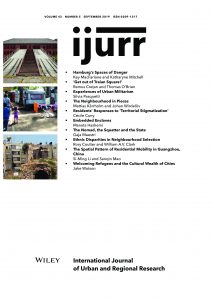Post‐communist Central and Eastern Europe has seen far right movements and parties gain considerable ground by drawing on nativist and ethnic claims to call for a return to an imagined past. In Romania, far right groups have been able to capitalize on a sense of injustice while also playing on historically negative feelings towards the Roma community. These patterns have been observed in Timişoara, where the group Noua Dreaptă (New Right) has established a foothold over the past decade by emphasizing claims that blame the Roma for loss of built heritage and corruption in the administration of property restitution. The aims of this article are to examine the emergence of Noua Dreaptă and its use of Roma stigmatization, and to consider the ways in which extreme views are normalized by appealing to beliefs and perceptions. The findings of the article show that pre‐existing prejudices can be a powerful force that not only targets marginalized communities, but also challenges administrative practices and builds organizational support. At the level of the city, it is possible to identify the way in which these claims can be more precisely calibrated to draw on concerns that circulate within the community.
Details
Written by:
Remus Creţan & Thomas O'brien
Digital Object Identifier (DOI)
10.1111/1468-2427.12775
About DOI

